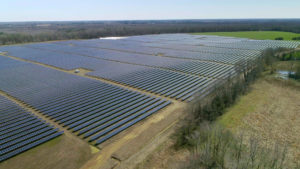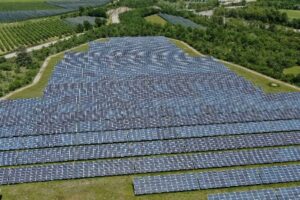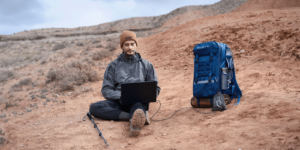Polls show most conservatives like clean energy. So why isn’t the North Carolina GOP doing more to support it?


BayWa r.e. developed and built the 26.2 MW Cork Oak Solar project in Halifax, North Carolina. The project began commercial operation in 2017. (Courtesy: BayWa r.e.)
by Elizabeth Ouzts, Energy News Network
Clean energy is aligned with conservative values. So says North Carolina Rep. Kyle Hall, a Republican legislator in his fifth term from a small town near Winston-Salem.
“It’s conservative to support market competition, consumer savings, property rights, and innovation,” Hall said at an event last November, when he received an award for spearheading a bill to promote rooftop solar and other clean energy measures in 2023.
The event also showcased what pollsters have known for years: Energy independence, less pollution, economic development, and other aspects of clean energy are popular with voters across the political spectrum.
Still, last year’s defeats and half-wins in North Carolina – where Republicans control both houses of the state legislature – show those factors aren’t always enough to propel policies favoring solar, wind, and electric vehicles forward. Obstacles remain in this purple state, including powerful special interests, misinformation, and individual lawmakers who have the power to make or break legislation.
“Polling consistently shows overwhelming public support statewide — in every community and across political ideologies — for more clean energy and for freer energy markets,” Carson Butts, the director of Conservatives for Clean Energy North Carolina, said in an email. But, he acknowledged, “clearly, we have more work to do.”
‘The perfect example’
Advocates like Butts believe they’re making progress in winning Republicans over to their cause, and there’s evidence for that.
In 2013, for the first time in over 100 years, the North Carolina GOP assumed control of the governor’s mansion and both chambers of the General Assembly. Members of their ranks immediately sought to weaken clean energy policies, with some success. Today, state-level solar tax incentives are gone, and land-based wind turbines are scant albeit legal.
But strong bipartisan support for clean energy also started to congeal, culminating in 2021, when the legislature and a Democratic governor elected in 2016 crafted a law to zero out electricity sector carbon emissions by midcentury. It remains the only such bipartisan measure in the region.
John Szoka, who helped write that law, may be the greatest testament to the efforts of right-leaning clean energy advocates. A former legislator who took office the first year of the GOP trifecta, today he leads the Conservative Energy Network, a nationwide association of state-based groups like Conservatives for Clean Energy.
“I’m the perfect example,” Szoka said in an interview, about how conservatives can evolve through education.
“When I first ran for office, I thought solar only existed because of subsidies and a bunch of crazy stuff,” he said. “But then, I ended up being a proponent for it. I made the transition because I had people who are trusted conservatives tell me what the truth was.”

‘Kind of a victory’
Though Republicans regained a legislative supermajority in 2022, the bipartisan emissions law faced no attacks last year. A largely symbolic measure to ban ocean-based wind turbines in state-controlled waters also never got a hearing.
“Sometimes we define success as something that didn’t happen,” said Brian Turner, a former Democratic state representative who now directs policy for Audubon North Carolina. “We didn’t get another wind moratorium,” he noted at a November energy conference. “That’s something we were able to bottle up and keep from moving.”
What’s more, Republicans allocated at least $10 million in matching funds for an avalanche of clean energy grants headed to North Carolina thanks to federal initiatives like the 2021 Bipartisan Infrastructure Law.
“There was significant funding allocated for clean energy related items, and that wasn’t necessarily a given,” said Cassie Gavin, policy director at the North Carolina Sustainable Energy Association. “Every state hasn’t done that.”
Rep. Hall also moved to raise the current cap on leasing rooftop solar from 1% of Duke Energy electricity sales to 10%, a key change for businesses and nonprofits looking to rely more renewable energy. After paring down the scope of the bill to satisfy Duke, it cleared the house with just 10 “no” votes — a milestone he called significant.
“Being able to carry it through,” Hall said in an interview, “I think was kind of a victory.”
‘A winning issue’
This activity aligns with poll after poll showing that voters across the political spectrum support wind, solar, and other forms of clean energy. Last year, a trio of surveys continued that trend.
The left-leaning North Carolina League of Conservation Voters found divisions between conservative and liberal voters on fossil fuels, but strong majorities in favor of “solar energy,” “clean energy,” and “renewable energy.”
Szoka’s group found that 67% of voters support community solar — in which individuals pay in for a share of a large solar farm — including 59% of Republicans.
And Conservatives for Clean Energy found that 73% of voters, including a majority of Republicans, would be more likely to support a candidate who backed policies to encourage “wind, solar, and waste-to-energy technologies.”
Consultant Paul Shumaker conducted the latter poll, a survey of 500 North Carolina voters last spring. In terms of running election campaigns, he said during a presentation of the results, “anything over 70% is a winning issue.”
But lawmakers didn’t always heed these surveys.
Shumaker’s poll, for instance, found that more than three quarters of voters, including 72% of Republicans, favored more competition in the electricity market.
Slightly smaller majorities said they would support “current legislation that would authorize a study to examine the public benefits of restructuring options for the generation, transmission, and distribution of electricity in North Carolina.”
The question references House Bill 503, aimed at analyzing the pros and cons of Duke joining a competitive wholesale electricity market, among other reforms. Like similar measures introduced in 2019 and 2021, it saw no movement last year.
“With the overwhelming numbers of voters supporting competition, why can’t we even study it?” asked Kevin Martin, the director of the Carolina Utility Customers Association, after the presentation.
“That’s a question for lawmakers,” Shumaker answered. He then relayed an adage he said came from the late historian David McCullough: “Special interests drive the narrative.”
‘Special interests drive the narrative’
Duke has a long public record of opposing the market reform study and did not respond to a request for comment for this story. But it wasn’t the only special interest that influenced policy last year.
The state budget prohibited an effort by Gov. Roy Cooper, a Democrat, to reduce pollution from the state’s transportation sector. Called the Advanced Clean Truck Rule, it would have required manufacturers to sell increasing percentages of electric heavy-duty vehicles.
The provision originated in the House and endured when the Senate passed its version of the state spending plan. Still, Hall said he fought to remove it in conference — to no avail.
“That sent a signal to electric vehicle companies across the country that you’re not welcome in North Carolina,” Hall said.
The source of the provision, Hall believes, was the North Carolina Chamber, the business lobby that represents a host of companies including truck makers Daimler Truck and Volvo Group. “They wanted that in the budget,” he said, “and like Duke Energy, they wield a lot of power.”
The Chamber celebrated the budget language on its website in September. “Government mandates and intervention into the market would stifle… innovation and investment, as well as increase costs in new trucks, on which nearly all of our members rely,” it said.
The lesson, said Hall, is that companies with a vested interest in clean energy policy — in this case manufacturers and fleet managers who want their companies to go electric — need to do a better job of educating both lawmakers and the trade groups they belong to.
“Groups like Duke and the [electric] co-ops are doing it,” Hall said. “This side of the energy sector needs to do it as well.”
Still, the clean energy economy remains nascent compared to the entrenched business interests that benefit, at least in the short term, from the status quo. That was certainly true last year, when the well-organized building lobby faced off against the more diffuse energy efficiency industry.
State standards for insulation thickness, window quality, and other energy-saving building features in new single-family homes have remained virtually unchanged for over a decade.
The state’s Building Code Council sought to change that, tying updated standards to a 2021 international model code. The move was expected to add an average of $5,000 to the cost of a new house but generate a positive cash flow immediately by lowering energy bills.
The math was generated by an independent government lab and confirmed anecdotally by green builders, who supported the code updates. But the powerful North Carolina Home Builders Association refused to accept it. A major campaign donor and presence in the legislature, the builders lobby instead claimed the average cost would exceed $20,000.
With the state in dire need of affordable housing, the builders’ reasoning was potent – convincing several Democrats and every single Republican to vote for a measure to reject the update and freeze the 2009-era codes in place until 2031.
“We do have an affordable housing crisis,” said Hall, a realtor by trade who’s observed soaring home prices even in his small town of King. And if the builders had less “burdensome regulations,” he said, they could build homes more cost-effectively. “I think that was a compelling argument.”
‘The Paul Wall’
Special interests aren’t the only ones with sway in Raleigh. Sen. Paul Newton, a Cabarrus County Republican and former Duke Energy North Carolina president, is widely viewed as the arbiter of clean energy policy for the Senate.
A lead negotiator for the 2021 decarbonization law, his positions frequently align with Duke’s. But he also asserts himself on bills that don’t directly concern the utility, and his influence extends beyond his chamber.
For four years in a row, he was thought to be the sticking point for government building efficiency legislation — a measure with no organized opposition and few detractors in the House. The 2023 Conservatives for Clean Energy poll found the measure had 79% support, including 68% of Republicans. Last year, the measure was reintroduced in the House with bipartisan support, but never got a hearing.
Newton’s key imprint from 2023 was his bill to promote nuclear, a carbon-free but non-renewable power source. The measure is more message than substance, but one key provision removes a requirement that Duke pursue more cost-effective measures like energy efficiency and renewables before trying to build a new nuclear plant.
“We support energy efficiency as the most affordable energy resource, and so we remain concerned about the changes to the [Certificate of Convenience and Public Necessity] section,” said Gavin of the Sustainable Energy Association.
When the bill first cleared the House, it included language sought by Hall to increase the solar leasing cap. That provision was rejected by Newton and other senators in the conference committee between the two chambers. “The Senate just stood their ground,” Hall said, “and flat out said ‘no.’”
Though his solar leasing bill is still eligible this year, Hall lamented its failure to become law in 2023. “That’s probably the most disappointing thing from the session,” he said.
Dan Crawford, director of governmental relations with the North Carolina League of Conservation Voters, said the situation was indicative of the dynamic on energy policy at the General Assembly.
In the House, “you have conservatives that are trying to lead and do something positive,” he said. “But then you have the Paul Wall in the Senate.”
Newton didn’t respond to a request for a comment for this story.
Along with Hall, many observers point to Rep. Larry Strickland, a Johnston County Republican in his fourth term, as an emerging leader on energy in the House.
But they also note the absence of Szoka, who left in 2022, and former Republican representative Chuck McGrady, who now sits on the state’s Board of Transportation.
“Those are two really big losses,” Crawford said.
‘Separating fact from fiction’
Szoka says one reason Republicans don’t always seem to follow the will of the majority of voters traces back to conservative grassroots circles.
Of the GOP voters his group polled who self-identified as “more conservative” on energy than their party as a whole, a whopping 64% said there was either no reason to be concerned about climate change or that more research was needed.
“So, that raises a question,” Szoka said. “How do you get elected? What’s going on in Republican grassroots organizations? Where do they get their information from?”
While outlets like Fox News have largely abandoned outright climate denial, misinformation persists about climate science, renewable energy sources, and energy policy. Throughout much of last year, for example, conservative media amplified false claims that offshore wind development was killing whales along the Atlantic Coast, an analysis by the liberal group Media Matters found.
Former president Donald Trump also trumpets such falsehoods, deepening distrust of the clean energy transition among Republican voters. And numerous studies have shown social media algorithms tend to push some users toward conspiracy theories and other misinformation.
At the same time, activists fighting solar, wind, and transmission projects, sometimes backed by fossil fuel interests, sow untruths in otherwise receptive or neutral rural communities.
“That stuff is still prevalent in a lot of rural areas, because there are people who actively work against clean energy, and they perpetuate misinformation,” Szoka said. Debunking it — a key mission of his organization — takes time and patience, he said, but it can work. “You’ve got to convince them,” he said, “and separate fact from fiction.”
Even so, with districts increasingly gerrymandered for partisan advantage, Republican candidates who support clean energy may never campaign on it: it doesn’t necessarily help them win a primary, and it rarely distinguishes them from their Democratic opponents.
“Most people don’t talk about it enough,” Szoka said, especially considering clean energy’s importance to unaffiliated voters – now the largest cohort in the state’s electorate. “And in some of these tight races, conservatives should talk about it more and the race wouldn’t be quite as tight.”
Still, advancing the clean energy transition may not be a simple matter of translating popular polling issues into policy. As politics becomes more nationalized and more polarized, with top Republicans deriding wind and solar, there’s some evidence that voters could be following suit.
Conservatives for Clean Energy has conducted polling for eight years. In 2015, nearly 87% of voters were more likely to vote for candidates who supported wind and solar. But that figure has seen a steady, if slight, decline ever since, and last year reached a new low of 73%.
The fossil fuel industry has also likely benefited from the centuries-old term “natural gas,” which despite its coinage describes a fuel that contributes substantial heat-warming pollutants to the atmosphere.
While most voters in the Conservative Energy Network poll believe we should put “less emphasis” on developing coal and oil, most said production of natural gas should stay “about the same.” Similarly, the North Carolina League of Conservation Voters poll found that 68% of all voters, including 55% of “left-leaning voters,” had a favorable view of natural gas.
Hall, who doesn’t advocate a full transition to “things like solar and wind,” believes the key is focusing on not just economics, but independence.
“If you ask people, ‘do you want to be energy independent, or do you want to rely on China and Russia for your energy,’ everybody’s going to vote for America first,” Hall said. “When I speak to constituents, their number one concern is that when they flip the switch that the light turns on — and if you could do it cheaper, cleaner, and made right here in America, that’s what they care about.”
Some way or another, clean energy advocates on the right are going to have to figure out what works. For all the intrigue in this year’s elections, legislative district lines leave little doubt that Republicans will retain control of the General Assembly. And left-leaning advocates say they’re not the best messengers in that case.
“There is an important role for Conservatives for Clean Energy to be that validator on the economy and clean energy,” Crawford said.
This article first appeared on Energy News Network and is republished here under a Creative Commons license.





